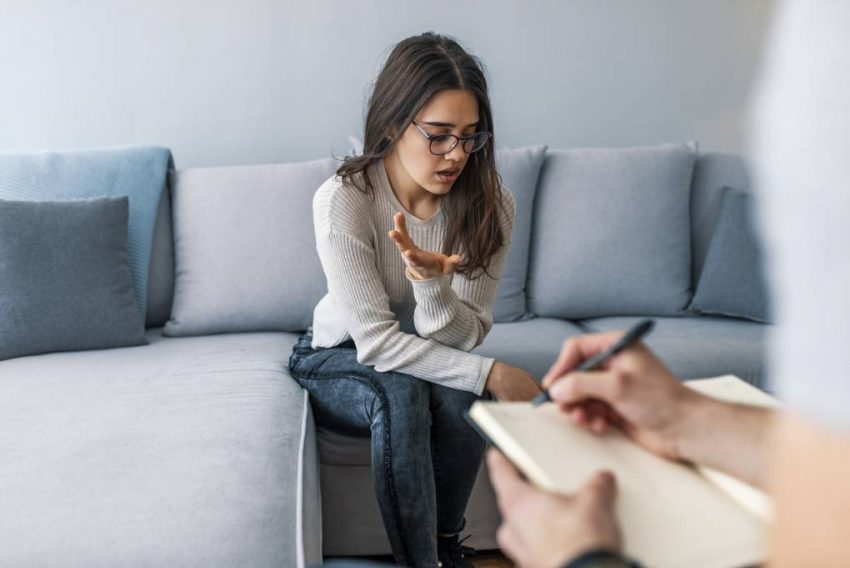
“There is no such thing as a disgrace, completely no disgrace in you having a therapist or me having a therapist,” she advised the category at Summit Excessive College in Breckenridge. “I may aid you get related if that’s what you want.”
Roxana is a part of a era that has grappled with unprecedented psychological well being struggles over the previous few years amid a pandemic that stoked stress, concern, and isolation for individuals younger and previous. She’s additionally considered one of hundreds of Colorado youth making the most of a rising variety of packages that purpose to make psychological well being help extra accessible and inexpensive for younger individuals.
These packages embody the state’s “I Matter” program, which offers six free telehealth or in-person counseling classes to college students in elementary via highschool. Up to now, this system has served greater than 5,600 college students statewide.
There are a selection of native packages, too. Roxana, 16, acquired a scholarship to cowl the price of remedy from Constructing Hope Summit County, a psychological well being nonprofit. The Aurora school district east of Denver started providing college students six free counseling classes a yr in the past and the neighboring Cherry Creek district began offering eight to 10 free classes to center and excessive schoolers in December. Each districts contract with Hazel Health, a telehealth firm primarily based in San Francisco.
It’s exhausting to know if Colorado youth are getting all the assistance they want. Throughout the first 9 months of 2022, psychological health-related visits to emergency departments within the Youngsters’s Hospital Colorado system have been up 74% in contrast with the identical interval in 2019, in line with a hospital spokeswoman.
That’s a part of the rationale why native and state leaders proceed to push for easy-access psychological well being help for youngsters and youths earlier than a full-blown disaster hits.
Michelle Weinraub, Cherry Creek’s chief well being officer, mentioned the district’s free counseling program grew out of a psychological well being activity pressure launched in early 2022. She recalled asking college students at one assembly in the event that they’d use free counseling classes they may entry on their telephones after college or work.
A few them have been so excited, they jumped out of their chairs, she mentioned.
“They have been like, ‘Sure, that’s what we would like,’” she mentioned. Then the scholars began speaking: “We are able to’t get an appointment except we’re in disaster … My pal tried to name and so they’re on a waitlist for six months. My pal needed to see this person who they knew anyone else was seeing, nevertheless it doesn’t settle for insurance coverage.”
In Might 2021, simply over a yr into the pandemic, leaders at Youngsters’s Hospital Colorado sounded the alarm concerning the spike in critical psychological well being issues amongst kids and youths, declaring a youth mental health “state of emergency.”
They pleaded for extra funding in addition to efforts to scale back bureaucratic constraints within the youth psychological well being system. Six months later the state launched I Matter.
This system isn’t meant to be the one “entrance door” to counseling, however fairly to function one low-barrier choice for any younger one who wants somebody to speak to, mentioned Charlotte Whitney of the state’s Behavioral Well being Administration, which runs I Matter. There’s no requirement to be extraordinarily anxious or depressed.
Whitney mentioned the mannequin might help set youngsters up for improved psychological well being long run “as a result of they know the place to entry providers and so they know the coping expertise to get them via these actually exhausting instances.”
College students 12 and over can join the remedy classes by filling out a simple online form. Youngsters below 12 can use the service, however want a guardian to take action. Whitney mentioned usually college students can get telehealth appointments inside days.
Often, she mentioned, college students wait longer in the event that they’re searching for one thing particular — for instance an in-person appointment in a rural neighborhood or a therapist that makes a speciality of transgender points.
In Aurora, about 230 college students have been referred for counseling via the free Hazel Well being program because the begin of the college yr. In Cherry Creek, which launched its program Dec. 5, about 200 college students have been referred for assist, typically by their mother and father. Officers in each districts say there aren’t any ready lists for appointments.
Timothy Swanson, a social employee in Colorado Springs, is considered one of about 200 I Matter therapists statewide. He sees as much as three college students every week, largely in individual, via this system. Usually, his purchasers open up first to his canine Smoke, a delicate pitbull combine who accompanies him to the workplace.
“They only love him. They only seize him and begin speaking to him,” mentioned Swanson. “It actually helps these youngsters as a result of plenty of instances they arrive in, they’re withdrawn, somewhat nervous, unsure what remedy’s about.”
Swanson, 63, mentioned many younger purchasers, whether or not they’ve come via I Matter or different avenues, wrestle with nervousness, anger, or despair. Generally, it’s due to pandemic-related disruptions in school, the trickle-down impact of guardian stress, or merciless habits from classmates.
A few of his purchasers have been advised by fellow college students, “Properly, when you really feel that method, why don’t you simply kill your self?”
“It’s actually damaging,” Swanson mentioned. “I encourage them to speak to counselors, to me, to their mother and father, to lecturers or whoever, to assist them develop a help system … a wholesome one the place they will get good solutions.”
As with different free remedy packages, I Matter goals to attach youth to continued counseling if they need or want it after the free classes. Swanson mentioned 30% to 40% of his I Matter purchasers proceed seeing him after the primary six classes, paying via medical insurance or different means.
Weinraub, of the Cherry Creek district, mentioned if wanted, Hazel Well being therapists work with college students and households to attach them to a neighborhood therapist after the free telehealth classes finish.
Even earlier than Roxana moved to the United State from Mexico at age 7, she was a high scholar. Her mother and father anticipated good grades and he or she delivered.
However her lessons received tougher in center college. Then, in seventh grade, the pandemic hit. Roxana, as soon as surrounded by buddies, discovered herself spending lengthy days alone in her bed room.
Her father would say, “You must come out and not less than eat one thing, drink some water,” Roxana mentioned. “I began attending to the purpose the place I used to be drowning myself in all my work.”
She felt claustrophobic, exhausted, and nervous about her mom, who labored as a nurse in Mexico. Finally, Roxana tried counseling nevertheless it didn’t go properly. She mentioned the therapist advised her, “It’s solely in your head. You’re simply pretending.”
By the center of her freshman yr in highschool, her struggles spiraled. She was skipping lessons and practically failing programs for the primary time in her life. She ended up within the hospital.
In the present day, Roxana is doing higher. She’s seeing a therapist she pertains to — one who’s Latina and a local Spanish-speaker like herself — and he or she’s let go of her drive for excellent grades. She’s additionally attempting to deal with the stigma round looking for psychological well being assist, one thing she’s felt as a part of the Latino neighborhood.
“Now we have this huge, huge tradition of what occurs in our household stays in our household and also you’re not going to inform our household enterprise round,” she mentioned.
However Roxana is aware of there are different college students like her in school, silently scuffling with their painful realities. That’s why she determined to say one thing throughout the latest civics class, stuttering a bit as she shared her story.
“If I don’t communicate out, different individuals gained’t both,” she mentioned.
Ann Schimke is a senior reporter at Chalkbeat, protecting early childhood points and early literacy. Contact Ann at [email protected].















